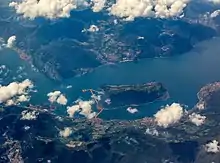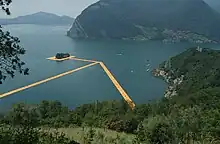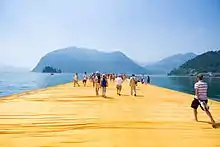| The Floating Piers | |
|---|---|
 | |
| Artist | Christo and Jeanne-Claude |
| Completion date | 3 July 2016 |
| Type | Site-specific art |
| Condition | Dismantled |
| Location | Sulzano and Monte Isola, Brescia, Lombardy |
| 45°41′46″N 10°05′48″E / 45.696059°N 10.096747°E | |
| Website | The Floating Piers |
The Floating Piers was a temporary, site-specific work of art by Christo and Jeanne-Claude, consisting of 70,000 square meters of yellow fabric, carried by a modular floating dock system of 226,000 high-density polyethylene cubes installed in 2016 at Lake Iseo near Brescia, Italy. The fabric created a walkable surface between Sulzano, Monte Isola and the island of San Paolo.[1]
Origins and development

Christo and Jeanne-Claude began conceptualizing of The Floating Piers in 1970. Their initial site was Rio de la Plata between Argentina and Uruguay. The couple also considered Tokyo Bay as a location before moving on to other projects.[2]
In late 2013, Christo settled on Lake Iseo as the location for The Floating Piers and dedicated the next 22 months to realizing the project. It was the first major project he undertook after the death of his partner and collaborator Jeanne-Claude.
The project was estimated to cost $11 million, but was later reported at closer to $17 million.[2] The funds were raised by Christo himself through sales of his project sketches and original art. Permits took less than a year.

The physical installation of the piers was handled by Deep Dive Systems, a company based in Bulgaria. They installed about 220 six-ton anchors in the lake floor at depths of up to 92 meters, over a period of three months. 226,000 cubes were then attached to those anchors, and covered by 70,000 square meters of nylon fabric.[3] Over 600 workers were involved in the installation.[4] Traffic planning required a 175-page document and cost €100,000 to produce.[5]
The fabric was cut and confectioned by the company geo - Die Luftwerker e.K. located in Lübeck. This company was also involved in the 3D measurement and installation.[6]
Opening

On 18 June 2016, the saffron-colored walkway opened to the public. 270,000 people visited the free installation in its first five days. Due to the unexpectedly large crowds, organizers began closing the installation from midnight to 6 a.m. each day to allow for cleaning.[7] On 22 June 2016, the large crowds caused some chaos at the main train station in nearby Brescia.[8]
Closing
On 3 July 2016, the work closed to the public. Local officials estimated that it had attracted 1.2 million visitors, or an average of 72,000 per day, over its 16-day run. Police estimates were even higher, at 100,000 visitors per day. Dismantling of the project began in the early morning of 4 July 2016.[9]
References
- ↑ "Italy: Christo 'walk on water' project opens on Lake Iseo - BBC News". BBC News. Retrieved 2016-06-20.
- 1 2 John Brownlee (2016-06-21). "Christo's Floating Piers Were 50 Years And $17 Million In The Making | Co.Design | business + design". Fastcodesign.com. Retrieved 2016-11-07.
- ↑ Diana Aleksieva (March 2017). "Ina i Rosen" [Ina and Rosen - Invisible to the eye]. InterViewTo (in Bulgarian). Retrieved 2017-03-31.
- ↑ "Art That Lets You Walk on Water". The New York Times. Retrieved 2016-11-07.
- ↑ "The Inside Story of Christo's Floating Piers | Arts & Culture | Smithsonian". Smithsonianmag.com. Retrieved 2016-11-07.
- ↑ Neuscheler, Tillmann. ""Floating Piers": Der Stoff für Christos See-Projekt". FAZ.NET (in German). ISSN 0174-4909. Retrieved 2020-01-28.
- ↑ Sophie Morlin-Yron (2016-06-27). "Floating art lets people walk on water at Italy's Lake Iseo". CNN.com. Retrieved 2016-06-29.
- ↑ "Chaos at Italian lake as crowds try to 'walk on water'". The Local. 22 June 2016.
- ↑ "Christo's floating piers closed". Deutsche Welle. 2016-07-04. Retrieved 2016-07-04.
External links
- Official website
- The Floating Piers photos from Time magazine
- Web cams list on The Floating Piers
- Floating Piers the work behind the project
- Google Maps Street View of The Floating Piers